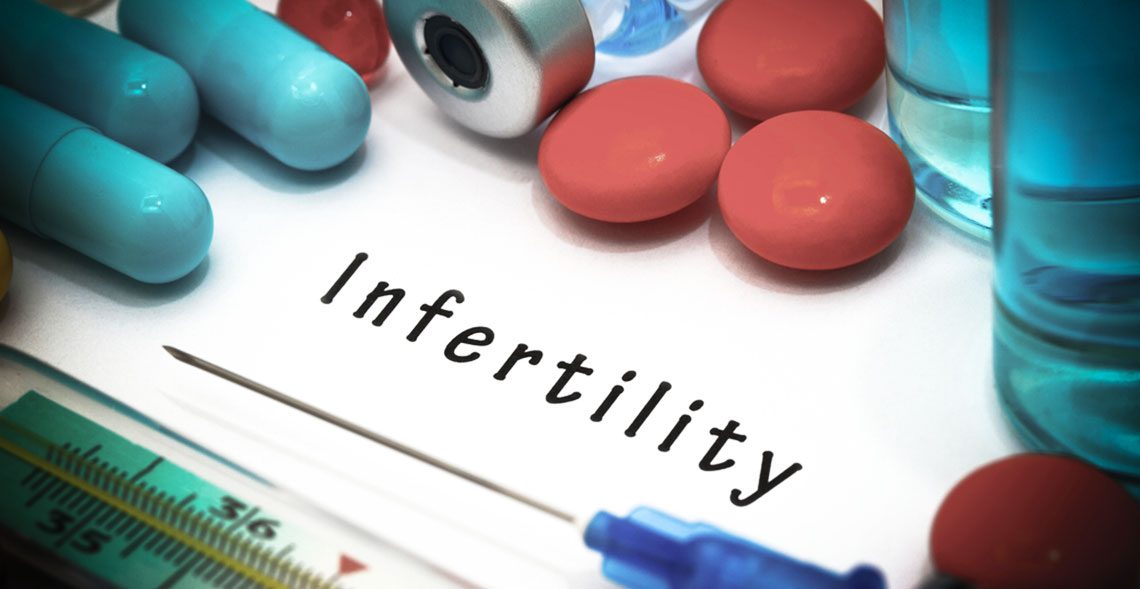Manage your stress
Managing your stress is very important for it helps increase the chance of conceiving. This plays a major role if you planning to conceive. Keep stress at bay; try spending time with family and friends. Read books and prioritize your commitments.
Female infertility is still easier to understand and cure because in the majority of the cases the problem is known.
Address your nutritional deficiencies
See what you not eating and keep a check on what you eating. Know the best fertility diets and the best food. Check with your doctor what you need to avoid in your meal. Ensuring a proper intake has much to do with enhancing fertility.
Tubal disease
Approx 15%-18% of infertility cases are due to a tubal disease which means your fallopian tubes are blocked, where you need to undergo some tests.
Age matters for infertility
Age has a direct and distinct correlation with infertility. Body strength, resistance, immunity and hormonal levels are at the peak during young age and hence it is important to keep this factor under consideration. The vitality and sustainability of our body get declined as we go old. Therefore it is always better to start infertility related treatment at an early age.
Sleep well
There have been studies that clearly show the correlation of lack of sound sleep and infertility. So you must be aware in case you are a frequent party animal. To be awake late night for a long time makes fundamental changes in the hormone levels thereby increasing the chances of infertility. Scientists say that people having inadequate sleep for a longer time face various health-related problems, including low fertility rates. It affects the hormonal balance in the body that is one of the major causes of infertility.
Diagnosis and treatment of female infertility
Diagnosing the root cause and deciding the treatment is the turning point in the whole process and experience of handling a wide variety of cases by the experts plays a major role in it.
Treatment of female infertility
The experts usually go by an elimination method. The first step will be to identify where ovulation is normal or it is absent at all. Checking by ovulation kit, recording body temperature or checking the level of progesterone is done to determine this. They perform multiple rounds of ultrasound tests as well. If the ovulation is not normal, then drugs are prescribed to stimulate the ovulation. In case ovulation appears to be normal, then experts check the other possibilities of antibodies responsible for destroying sperms before the fertilization or obstacles in the fallopian tube. The treatment normally involves medication, microsurgery or a combination of both.
Diagnosis and treatment of male infertility
Male fertility is extremely complex to diagnose and cure. At the International Fertility Centre, we try to find out the fundamental reason by various tests and research. Semen samples are tested in the laboratory to know the sperm count, sperm strength and other factors. Hormonal levels are checked to determine the testosterone levels. Physiological problems like defects in genital organs, STD or VD, retrograde ejaculation are also checked. Here we take all the possible efforts to make pregnancy successful and bring the little angel in this world.
Strain in the relationship
Dealing with infertility becomes further complicated with the strain in the relationship between the couple. Both partners must keep the relations absolutely tuned and no internal conflicts or friction should arise. This is the time of providing complete physical, mental and emotional support to each other. For the male partner, the responsibility gets further increased because the female partner has to undergo a lot of physical pain and suffering. The treatment process has multiple cycles of IVF pregnancy, various tests, and procedures that cause tremendous pressure on the female. She has to be understood with sympathy and emotional way to avoid mental trauma. Training and application of certain mental and psychological techniques might help a lot.
Known as unexplained infertility
(where the cause of infertility is not known or cannot be diagnosed), such a situation can often be quite frustrating for everyone involved. Unfortunately, it is quite common and can sometimes hinder the fertility treatment process. Up to 10% of couples who visit a fertility clinic for treatment receive a diagnosis of unexplained fertility. Always remember that infertility can be cured like any other disease and by being fit you can fight infertility.
Fact #1 Overall good health isn’t necessarily a sign that you (or your partner, for that matter) are fertile.
You exercise regularly, eat a nutritious diet, and have enviable cholesterol and blood pressure levels. That’s great, but it doesn’t mean you’re fertile. One in 10 healthy couples of reproductive age will experience fertility problems. The causes are variable and equally attributed one-third of the time to the female, one-third of the time to the male, and one-third to unidentifiable reasons or to both partners. Unfortunately, the biggest factor that impacts fertility is something none of us can control: age, says Sam Thatcher, MD, a reproductive endocrinologist at the Center for Applied Reproductive Science in Johnson City, Tennessee, and author of Making a Baby: Everything You Need to Know to Get Pregnant (Ballantine, 2000).
For healthy women, fertility peaks in their mid-20s begin declining at age 27, then nosedives around age 37. If you are in your mid-30s or older and trying to conceive, you need to be very pointed in your efforts, Dr. Thatcher advises. That means figuring out when you’re ovulating and having sex at those optimal times. And if you’re over 35 and concerned about your fertility, don’t settle for a gynecologist saying “Just give it time,” cautions Dr. Thatcher. The American Society of Reproductive Medicine advises women age 35 or older to consult a fertility specialist if they fail to get pregnant after six months of unprotected intercourse. Women ages 37 to 40 should wait no longer than three months.
Fact #2 Your weight affects your ability to conceive.
Surprise! Twelve percent of all infertility cases are rooted in weight issues. If your body is chronically malnourished or overexercised, you can’t menstruate, since a minimum of 22 percent body fat is necessary for normal ovulation and reproductive competence. On the other side of the scale, being overweight can alter hormone chemistry and help prevent ovulation. The good news is that shedding or gaining pounds can easily remedy weight-related infertility; more than 70 percent of women conceive spontaneously once they reach healthy weight parameters. Doctors consider a body mass index (BMI) between 19 and 25 ideal. (BMI = weight in pounds divided by height in inches, divided by height in inches again, multiplied by 703. Example: 135 pounds, divided by 66 inches, divided by 66 inches, multiplied by 703 = BMI 22.)
Weight not only potentially impacts fertility but pregnancy as well. According to the March of Dimes, overweight women who become pregnant are at greater risk for pregnancy-related high blood pressure and diabetes, and underweight women are more likely to deliver a low birth weight baby. If you are at a reasonable weight and trying to conceive, now is not the time to begin training for a marathon or go on a crash diet.
Fact #3 Sexual positions — coital or postcoital — don’t affect your chances of conception.
No study has confirmed that one position is more effective than any other in achieving pregnancy. In fact, sperm can be found in the cervical canal mere seconds after ejaculation, regardless of position. Of course, aiming for the deepest penetration and maximum cervical contact makes sense, but the optimal position varies because every woman’s body is different.
And since sperm starts swimming immediately after ejaculation, it isn’t necessary for a woman to become a gymnast or a yoga master to make a baby. There may be a little advantage to lying around after intercourse to keep the sperm inside you, but there’s absolutely no value in standing on your head, says Dr. Thatcher. So savor the mood however you please.
Fact #4 The biological clock ticks for men too.
The notion that age-related fertility decline is only a female factor has been debunked by a recent British study. Researchers at Bristol and Brunel Universities evaluated 8,500 couples to determine the impact of age on the length of time it took to conceive. They discovered that while only 8 percent of men younger than 25 fail to impregnate their partner after a year of trying, that number grows to 15 percent after age 35. Despite other factors, such as the fact that frequency of intercourse drops off with age, the study suggests that paternal age, too, may be a consideration for couples struggling with infertility.
Fact #5 Ovulation day is not necessarily the best day to try to conceive a child.
Sperm can live in the female reproductive tract for up to three days after intercourse, so having sex every day, or even on ovulation day, is not necessary. What is critical is knowing when you are fertile. According to data from the AIA, 20 percent of couples seeking infertility treatment are not timing intercourse correctly.
A woman is fertile for a period of six days, the five days leading up to ovulation (when the egg is released from the ovary) and the day of ovulation. A study by the National Institute of Environmental Sciences found, much to the researchers’ surprise, that a woman ‘s capacity to conceive seems to end on ovulation day. So if women charting their basal body temperature are waiting for their temperature to go up to have intercourse, they’re too late, warns Melissa Holmes, MD, associate professor of obstetrics and gynecology at the Medical University of South Carolina in Charleston. She recommends using ovulation kits because they let you know when you’re about to ovulate. Having sex on the two days prior to ovulation offers the greatest chance of conception.
Fact #6 However brief your partner’s particular choice of underwear, it’s unlikely that it will impact his fertility.
Up until several years ago, future dads were discouraged from wearing briefs because their tight fit held the testicles close to the body, raising scrotal temperature and causing a decrease in sperm count or concentration. And while it is true that very high temperatures can be harmful to sperm, choice of underwear does not heat things up enough to make an impact, according to two recent studies. So if briefs (or bikinis, for that matter) are more likely to heat things up between you and your partner, stock up on those Jockeys!
Fact #7 Birth control choices have fertility implications.
It sounds like a cruel joke, but it’s true, says Dr. Holmes. The method of contraception that a woman has used may also impact conception. Women who used progesterone injections of Depo-Provera may have to wait for normal fertility to resume after they’ve stopped using the drug for six to nine months or even a year. It may take women who use Lunelle, another injectable form of birth control, six months to a year to have a normal menstrual and ovulation cycle.
And while many women believe that the effects of the pill linger long after they stop using it, that’s yet another myth. Furthermore, it’s not necessary to wait for several cycles to “wash out” oral contraceptives before getting started. In fact, immediately after the pill is stopped, there can be an anovulatory rebound effect, resulting in a super-fertile period. Despite the increased chances of conceiving right after stopping the pill, Dr. Holmes still recommends most of her patients go off it two or three months prior to trying to conceive. That way, you can more predictably determine the length of your cycle, identify your fertile days, and be able to better date when you conceived once you actually do get pregnant.
Oral contraceptives also help to preserve fertility — pill users have a decreased risk of illnesses that harm fertility, such as endometriosis, PID, and ectopic pregnancy. The bottom line? Take stock of your birth control choices before you decide you want to get pregnant.
Fact #8 Specific foods or diets do not have a large impact on fertility.
There is no magic diet that will increase the chances of sperm meeting egg; the best thing you can do is eat a diet high in nutrients and fiber and cut down on your consumption of highly processed foods. It’s also important for couples trying to conceive to get plenty of folic acids, which helps prevent birth defects and can improve sperm count.
And while you may have heard that caffeine can hamper conception, don’t toss out your favorite mug just yet. Though there have been reports that women who drank more than one cup of coffee daily were half as likely to conceive per cycle as those who drank less, researchers acknowledge that delayed conception could have been attributed to other factors, and subsequent studies have failed to find a significant link between moderate amounts of caffeine and fertility.
Some research has shown that zinc may improve sperm count, but don’t go overboard on any one nutrient. Like so many things in life, fertility thrives on balance.



